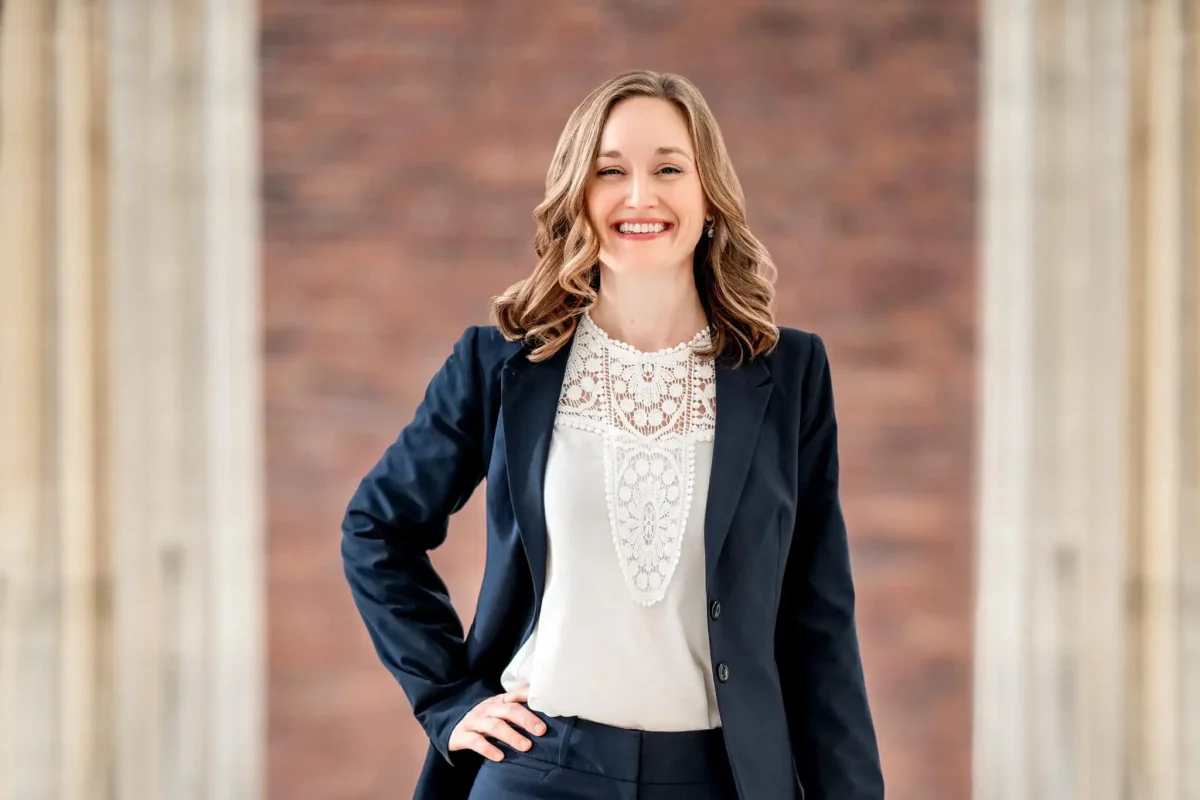Classes, extracurriculars, sorority meetings, sports practices and power naps – these are the activities that comprise the typical college student’s schedule.
Jolessa Churchill, 20, isn’t the typical college student. She not only balances the responsibilities of a sophomore social work major, but also the responsibilities of a mom.
Her day begins at 6 a.m., Monday through Friday. First things first, she packs both her and her 2-year-old daughter Alyx’s backpacks – textbooks and notebooks in one, Pull-Ups and baby wipes in the other.
“I get ready before I wake her up because doing it together is horrendous,” she said with a laugh.
After she drops off Alyx at St. Vincent Child Care Center at 7:30 a.m., Churchill drives to Gannon University for morning classes. In the afternoon, she works as a receptionist at the YMCA of Greater Erie.
“I won’t work past 5,” she said. “That’s when she’s out of day care. And then I’m home with her.”
Churchill’s evenings consist of playtime, dinner and bath time. Once Alyx is tucked in, Churchill gets started on her homework, which can keep her up until midnight.
“Days go from 6 a.m., to about 12 or 1 a.m.,” she said. “And then up again at 6.”
It’s a demanding routine, one that is very different from most of her peers’. That’s why she teamed up with Heidi Noyes, Gannon’s director of Commuter Life, to form a group for students with children.
Churchill and Noyes began talking about creating a student-parent group in September. Since then, the group has held bimonthly gatherings.
Noyes said she attended a conference last year and learned about a college that offered a comprehensive program for students with children. The program provided a myriad of resources, including affordable child care, weekly meetings and information on government assistance.
“I was just really inspired by that and thought, ‘I know that we have parents here who struggle too,’” she said.
The group, made up of about 10 student parents, meets Tuesdays at 11 a.m. in Palumbo. The parents range in age from 18 to 37, with children from 8 months to 16 years old.
In the past, Noyes said, she tried to link parents individually, but some did not necessarily want to make their status as a parent public knowledge for fear of judgment. She said she believed the group would give students with children the opportunity to find each other if and when they chose to.
Students who are parents face many unique challenges that students who aren’t parents either do not experience or not to the same degree. For example, some students have children who suffer from chronic health issues.
“It’s challenging enough just being a student and being a parent,” Noyes said. “Dealing with a sick child makes it even more challenging.”
She said students with children often struggle with prioritizing.
“You need to come to school, you need to get your homework done and you need to make sure your children’s needs are met,” Noyes said.
Sometimes that means other tasks fall to the wayside. Noyes, who has young children of her own, said that although she is not a student, she can relate to some extent.
“So I don’t get things dusted,” she said. “It’s more important for me to be able to read a book to my son.”
Another struggle for student parents: finances. With all their added expenses, Noyes said, they usually try to fit work into their schedules. Parents who are working fulltime may have to reduce their hours to parttime to accommodate schooling, which puts a strain on their income.
“They’re all very proud,” Noyes said. “They don’t want to ask for things.”
For that reason, she said, she has to push student parents to sign up for Gannon’s Christmas Angel program. Launched in 1992, the program asks the Gannon community to purchase toys and other materials for students’ children.
“I have literally stood outside of a classroom with my cellphone telling them, ‘You need to call and get enrolled,’” Noyes said. “‘It’s a temporary thing. Let people help you.’
“It can be really, really challenging for some of the families,” she said, “but I’m not above hunting them down.”
Noyes said student parents sometimes feel as if others judge them based on their unique situation. She said one young mom raised her hand in class when a professor asked if anybody in attendance had children.
“She feels that everyone is treating her differently this semester as a result, now that they know that she’s a mom,” Noyes said. “And that really, really bugs her.”
The student-parent group not only provides a sense of community, but also a source of advocacy. Noyes and Churchill said they’d like to see a few more accommodations for students with children at Gannon.
Noyes said both Penn State Behrend and Mercyhurst University provide offsite day care. The day care facilities are available to anyone in the Erie community, but students and faculty receive priority enrollment and pay reduced rates.
For example, the Penn State Behrend Early Learning Center charges students, faculty, staff and alumni $185 a week for full-time (Monday through Friday) childcare for someone Alyx’s age. Other members of the community pay $192. Additionally, Penn State’s Office of Human Resources offers a childcare subsidy for qualifying students.
Noyes said the reason Gannon does not offer similar services is likely a matter of feasibility at this point, as university day cares require a tremendous amount of money to set up. The administration would need to acquire permits, hire a staff and recruit early childhood education majors. Gannon’s location in downtown Erie also poses the question of where exactly to house a child care facility.
Though Gannon is the only four-year undergraduate college in Erie that does not have a day care, it is not in the minority nationwide. According to the Institute for Women’s Policy Research (IWPR), just 7 to 9 percent of private two- and four-year colleges include child care facilities. Two- and four-year public colleges do better, with 49 to 57 percent providing child care options.
Still, the IWPR estimates that colleges only have enough slots for 5 percent of the student parents who need them.
“Child care facilities not only allow parents peace of mind and give them more time to devote to schoolwork and earning income,” Elisa Garcia, the office and program coordinator for the IWPR, wrote, “the facilities can also help increase retention among a group that is likely to drop out of school. Fifty-seven percent of student-parents are low-income, meaning that off-campus care centers – which in many states cost more than average annual rent payments – are not realistic options for many student parents.”
Garcia goes on to point out that children of college graduates are more likely to attend college themselves, so supporting low-income student-parents is one way to break the cycle of poverty.
Churchill said she thinks a day care is a huge selling point for students like her who are deciding between schools. If Behrend offered her major, she said, she almost certainly would have ended up there.
Besides university-affiliated daycare, Noyes said, she’d love to see priority registration at Gannon for students with children because they especially need to find classes that fit within their busy schedule.
As of now, the student-parent group is not officially recognized by the university. Noyes and Churchill are still hammering out details and seeking commitment from members.
“It’s a slow start with the group,” Noyes said, “but I think once the word is out more it’ll turn around.”
Churchill said she is excited to continue expanding the group in terms of size and activities this semester. She said she believes it’s important for student-parents, like any other segment of the student body – physician assistants, musicians, international students, etc. – to have a niche on campus.
“We started it so parents could get in touch with each other,” Churchill said.
She said it isn’t just a support group, but a way to recognize students on campus who have children.
Noyes added that student-parents often feel alone in college.
“I think it’s nice just for them to get together because they do have unique experiences that other students don’t have,” Noyes said.
Churchill said she agreed that the student-parent group helps connect like-minded individuals.
“It’s great to know other parents here because they get the situation,” Churchill said. “Outside Gannon, you meet parents, but they’re just working. They don’t understand the school aspect of it.”
John Liszka, a junior psychology major and member of the student-parent group, said he tends to have trouble relating to his friends who don’t have children.
Liszka, 21, holds a work-study job in Old Main and recently accepted a part-time position as a dietary aid at Saint Mary’s Home of Erie. He also attends school fulltime and cares for his 2-year-old son Braeden three to five days a week.
“I’ve had people who’ve asked me to come out to dinner or go to a party, and when I tell them ‘I can’t, I have my son,’ they get upset at me,” he said.
Churchill said she has experienced a similar disengagement with people her age.
“I don’t think people our age understand that we have someone else to take care of,” Churchill said. “You notice that you stop getting invited places.”
They said they try to make time for fun, but it’s a more low-key type of fun than their peers without children enjoy.
“I mostly watch movies at home,” Liszka said. “I’m too tired for much else.”
Churchill and Liszka said that they occasionally receive strange looks when other students find out they have children, but the two try not to let it bother them.
“I’ve seen it so much, it kind of just filters through now,” Liszka said. “I don’t even notice anymore.”
They said professors are typically understanding of student-parents’ unique hardships and circumstances.
“Most of the professors I’ve dealt with are sympathetic,” Churchill said.
Churchill said that her adviser, Sara Lichtenwalter, Ph.D., has been particularly supportive.
Lichtenwalter, an associate professor in Gannon’s social work program, said that she believes it is important to reach out to all students who encounter challenging circumstances – parenting, illness, jobs and team sports, among others.
“Education is not one size fits all,” Lichtenwalter said. “The class assignments have to be completed and the skills have to be mastered, but there are many ways to help students accomplish this.”
She said that she tries to help students by meeting outside the classroom and making herself available during evenings and weekends. She also guides their approach to assignments in ways that allow them to grasp the material more completely.
“The most important thing is trying to understand their unique barriers to success,” Lichtenwalter said. “This usually involves helping students work smarter not harder.”
Lichtenwalter said that juggling child care, school and employment is a formidable task. Doing so successfully, she said, affects both students and their children.
“I have a great deal of respect and admiration for students with the courage and dedication to pursue their degree under these circumstances,” she said. “The academic success of students like Jolessa will be a prime determinant of the academic success of their children.”
Now that Gannon’s student-parent group is in its second semester, Churchill and Liszka have a place to connect with others who deal with similar circumstances. They can share advice and tips for everything from work to meals to low-cost, child-friendly projects. Ultimately, they can encourage one another on the road to graduation.
Churchill said she plans to apply to master’s programs after she completes her undergraduate degree. She’d like to pursue a career in counseling.
The National Campaign to Prevent Teen and Unplanned Pregnancy, a nonprofit, nonpartisan organization, reported that less than 2 percent of girls who have a baby before they turn 18 attain a college degree by age 30. This means that Churchill will need to beat overwhelming odds on her path to becoming a counselor.
Liszka also plans to seek a master’s. He said he hopes to get a job as a school psychologist.
Churchill said she will be especially proud when she accepts her diploma at commencement.
“We’re breaking the norm,” she said, referring to her fellow student-parents. “People think we can’t do it, and it’s hard, but we can.”
APRIL SHERNISKY







